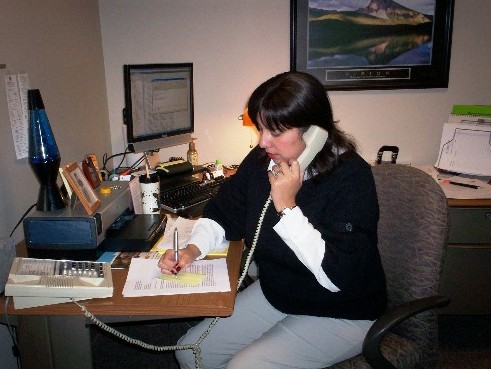Educational Support Program receives $150,000 in federal funding

Courtesy Photo / gvsu.edu Victoria Powers, an Educational Support Program Advisor, works at her desk in the ESP office
Oct 24, 2010
For some students, seeking a college degree is not an automatic. For some students, university life seems to be an overwhelmingly complex environment of social, academic and professional interactions. For some students, the cost of tuition is an unaffordable expense.
The Educational Support Program at Grand Valley State University helps such students.
Currently serving 215 of GVSU’s students who meet federal income requirements for special assistance as well as first-generation students, the ESP received an extra $150,000 of federal funding this year to better meet these students’ needs for the next five academic years.
ESP is part of the national program TRiO, which is funded by the U.S. Department of Education. In the past, ESP at GVSU has received $1.5 million in federal grants, but this year the grant was increased to $1.65 million, which will last them the next five years when the program head must reapply for the grant.
Melissa Selby-Theut, director of GVSU’s ESP since 2008, said the money will be used to enhance existing ESP services as well as start new ones.
“Our primary objective is to increase rats of graduation, retention and academic achievement,” Selby-Theut said.
ESP accomplishes this goal through academic, personal, career and financial advising, Student Support Grant scholarships, textbook giveaways and cultural trips, among other available resources. With the additional grant money, ESP has begun a financial literacy training course to help students understand loan options, budgeting and establishing credit, and they also developed learning communities for students and faculty in Math 110 and WRT 150 classes.
“We tell students we’ll do anything and everything to help them graduate,” Selby-Theut said.
Selby-Theut said students enrolled in ESP face unique barriers traditional students may not deal with, such as a lack of understanding of the university structure, not having the support of family members who can relate to their experiences and overcoming stereotypes.
“We’re fortunate Grand Valley is such a welcoming community,” she said. “They have systems in place specifically for these students.”
It can still be a challenge to promote an awareness of the specific needs of these students, Selby-Theut said. Though seeing ESP students graduate is well worth any extra time and effort, she added.
“Watching our students graduate and go out in their communities and break the cycle of poverty and fulfill their potential – I experience the joy and benefits of their achievement,” she said.
The ESP employs three advisers who are qualified to help students in area they made need assistance. Advisers meet with students about three times a semester to go over upcoming assignments, evaluate degree progress, inform students of scholarship opportunities and address any questions or concerns the students may have.
ESP also plans about four cultural trips a year to cities such as Chicago and Detroit or to different events such as an opera or dinner at a Thai restaurant. The purpose is to give ESP students experiences they may not otherwise have, all free of charge.
Reginald Jones, now a graduate student at GVSU, joined the EPS program when he transferred to GVSU during his junior year.
For Jones, in his late 40s, ESP has made all the difference in his educational experience.
“Without them (at ESP), I don’t think I’d be in grad school,” Jones said, who is now pursuing a degree in social work to follow his bachelor’s in sociology.
Jones mentioned the extra tutoring, mentoring and cultural diversity of the group as some of the benefits of the program. He said the social aspect of belonging to such a group was also extremely important.
“You come in and don’t have a chance to really bond with the students,” he said. “I met students I otherwise wouldn’t have met and formed a social circle.”
As a non-traditional student and a first-generation student, Jones said the social environment at a university can be a big challenge, but ESP helped him connect with other students who share a similar set of experiences.
“You need those words of encouragement, those people who believe in you and are willing to help you,” he said.
Jones said he especially enjoyed the cultural events organized by ESP. He talked about eating at a Thai restaurant, going to an opera and attending an event about the Beatles.
“I did things I didn’t have any idea I would even like,” Jones said. “It opened up my mind to things that I can do.”
Students must apply to be included in ESP and can do so by downloading the form off the ESP website, www.gvsu.edu/esp. The program is currently equipped to serve a small fraction of GVSU’s student body, so there is a wait list for the program. Jones recommended all first-generation students at least try to get involved in the program.
“Everyone who goes to TRiO can reach their goals, no matter what obstacles they have to overcome.”






















